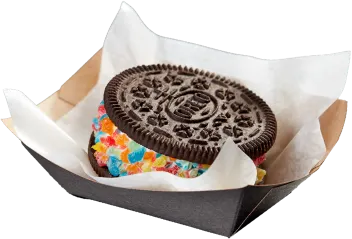Consumers say rewarding snacks and dessert options are an important part of a balanced diet.
The line that separates better-for-you snacks from indulgent treats is increasingly blurring.
That’s because today's consumers want to take control of their diets and achieve a healthful balance between nutrition and rewards. To do so, they’re eating flavorful treats — which they view as essential to their emotional well-being — in moderation and supplementing those indulgences with healthy snacking.
More than three-quarters (77%) of adults worldwide agree that there’s a time and place for healthy snacks — and a time and place for indulgent ones.
Emerging terms like “permissible indulgence” and “healthy indulgence” encapsulate this trend perfectly because they account for foods that qualify as treats yet possess positive attributes. Such attributes can include health benefits — increased protein or reduced carbohydrates, for example — or environmental benefits like those derived from sustainable sourcing.
Amid the COVID-19 pandemic, consumers have shown increased interest in the health benefits of the foods they eat. A recent report from Tastewise, which analyzes internet searches and social media posts to discern trends in consumer attitudes, cited significant increases in food-related searches around terms such as “immune system.”
“While the last year has seen consumers increasingly turn to food and beverage for functional benefits, we’re seeing staggering growth in the trend during this time of coronavirus,” Tastewise writes.
Consumers have been seeking out foods with the attributes that meet their own individual health goals, which can include boosting their immune systems, losing weight or gaining an energy boost. “People want to be in control,” explains Ray Camillo, CEO and founder of Atlanta-based Blue Orbit Restaurant Consulting. “People are customizing their own experience.”
Healthy Snacking
It helps that consumers consider snacking itself to be a healthful behavior: Snack food, many of them say, is a better alternative to loading up on the traditional three square meals a day. In fact, 66% of consumers somewhat agree that having a snack instead of a meal can be part of a healthy diet, according to Technomic. The NPD Group, meanwhile, found that “snackified” meal substitutes account for about a quarter of snack consumption — up from 21% in 2012.
“The role of snack food is changing in reaction to Americans’ desire for balance, portable snack foods and holistic wellness,” says David Portalatin, food industry adviser at The NPD Group. “It’s no longer about depriving yourself of something you enjoy eating. Today, it’s about giving yourself permission to eat indulgent snack foods in moderation.”
In the current environment, offering prepackaged, grab-and-go snacks allows operators to provide their customers with satisfying rewards that can also meet their demands for holistic health solutions.
Let Consumers Decide
One of the challenges operators face is that it’s not always clear what consumers really want in their diets. While consumer polls indicate interest in better-for-you foods and snacks, the choices consumers actually make often are out of sync with their stated intentions.
Blue Orbit Restaurant Consulting’s Camillo has seen this firsthand. After helping a new hotel chain develop a health-focused restaurant menu, he subsequently was asked to revamp it with indulgent fare after guests failed to respond to the better-for-you offerings.
His philosophy now: Create opportunities for indulgence and let consumers decide whether to opt in or out.
Some operators may want to offer some sugar-free snack food and dessert options to appeal to consumers seeking to avoid sugar, such as diabetics, but overall, operators shouldn’t be deterred by dietary restrictions. In fact, diners following many special diets, like gluten-free, often have many indulgent snacks and desserts they can choose from, Camillo points out.
Consumer behavior also sometimes contradicts stated intentions, Camillo continues. For example, his consulting firm once conducted focus groups in which consumers spoke eagerly about their healthy eating habits. But when researchers prompted them to identify examples of these snack foods, the participants offered only “blank stares.” What’s more, “When we did look in the cupboards, there was nothing healthy,” he says.
Guilt-Free Rewards
It’s important for restaurant operators to remember that consumers don’t necessarily feel guilty about indulging in full-flavor snacks. Rather, they see doing so as an important way to enjoy the dining experience and to round out a well-balanced diet that may otherwise incorporate better-for-you items.
“Flexible and balanced diets are gaining traction among U.S. consumers who are striving to combine healthy eating regimens with occasional treats,” Patty Johnson, associate director of purchase intelligence at Mintel, wrote last summerwrote last summer, citing research from Mintel’s 2018 Global Food and Drink Trends report.
Indulgence is an important part of consumers’ quest to lead a healthful and balanced lifestyle. Restaurant patrons are often seeking to reward themselves if they choose to order snacks or desserts, and operators should offer their customers options that enable them to choose for themselves how they incorporate these items into their diets.
For more guidance on how to satisfy the snacking demands of today’s consumers,check out Mondelēz International’s recent white paper.
Stay Top of Mind With Operators
Read about 6 Trends Changing and Challenging the Foodservice Status Quo in 2022. Read Article
Recent Posts
All in Good Time: What Makes for a Winning LTO in 2021?
Chefs Cook Up the Future of Fast Casual Restaurant Operations
Chocolate 2.0: The Future of Chocolate Snacks & Desserts
Delivery-Only Restaurants Steer Foodservice in New Direction
Posts by Topic

Join our email list and be the first to know when we drop new articles, trends and insights with updates delivered directly to your inbox.




